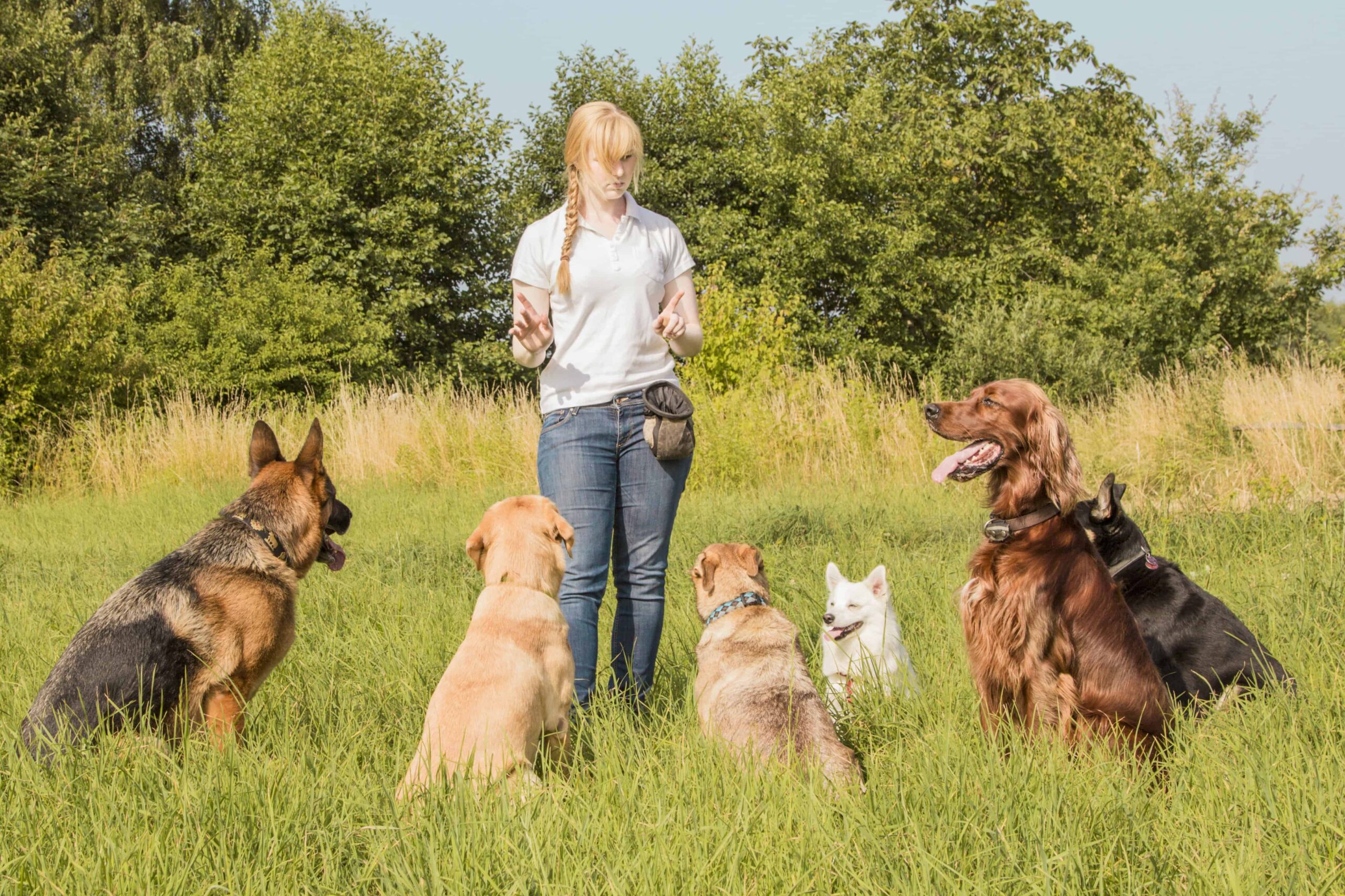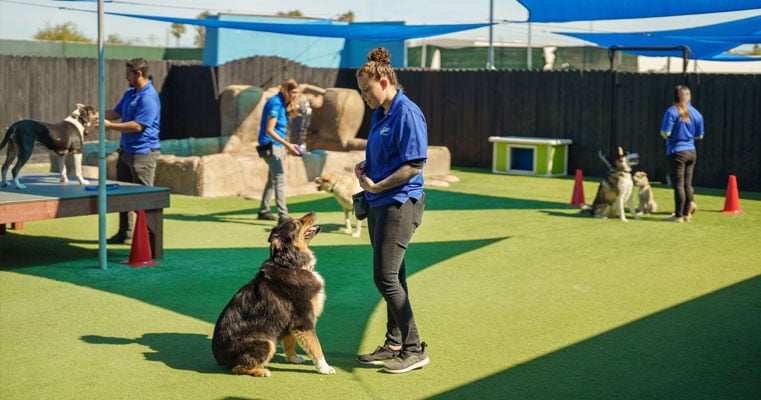Change Your Pet with These Specialist Dog Training Tips
Change Your Pet with These Specialist Dog Training Tips
Blog Article
Essential Tips for Successful Dog Training: A Guide for Family Pet Owners
Efficient canine training is a multifaceted procedure that calls for a calculated method tailored to both the pet dog's temperament and the proprietor's purposes. Comprehending how to browse these challenges can significantly boost the training experience, inevitably transforming the partnership between owner and canine.
Recognizing Dog Actions
Recognizing pet behavior is crucial for effective training and fostering a harmonious partnership between canines and their owners. dog training. Pet dogs interact primarily through body language, vocalizations, and actions, making it critical for proprietors to analyze these signals accurately.

Socialization plays a significant role in dog actions; direct exposure to various environments, people, and various other pets can dramatically impact a pet's personality. In addition, variables such as type attributes and specific character ought to guide training approaches, as some types might have certain behavioral attributes that require tailored methods. By recognizing these aspects, owners can develop a supportive atmosphere that encourages favorable habits, leading to effective training results and a deeper bond with their pet dogs.
Establishing Regular Commands
Efficient interaction with your canine begins with developing consistent commands. This foundational aspect of training is crucial for cultivating understanding between you and your pet dog. Consistency in the commands you make use of makes sure that your dog can accurately associate certain words or expressions with the preferred behaviors.
When choosing commands, pick clear, unique words that are very easy to state and differentiate from each other. Stay clear of using similar-sounding commands that might puzzle your pet. Making use of "sit" and "stay" is proper, yet "sit" and "hit" might lead to misconceptions.
Additionally, maintain the exact same tone and volume for each command. Canines are delicate to vocal hints, so varying your tone can develop complication.
It is equally essential to guarantee that all family members are on the very same page concerning the commands used. A united front in command usage will certainly stop blended signals and strengthen the knowing process.
Favorable Support Methods
The power of positive support in canine training depends on its capacity to motivate desired habits via benefits and praise. This strategy is grounded in the concept that behaviors followed by favorable end results are more probable to be duplicated. By incorporating favorable reinforcement right into your training program, you can effectively shape your dog's actions in a constructive fashion.
To execute favorable reinforcement, it's vital to recognize what motivates your pet, whether it be treats, playthings, or verbal appreciation. When your dog does a wanted action, such as resting on command, instantly compensate them with a treat or affection. This organization in between the command and the favorable outcome enhances their understanding.
It's crucial to timing the benefits properly; supplying the reinforcement within seconds of the wanted behavior aids your dog make the link (dog training). Additionally, consistency is crucial-- ensure that all household members use the exact same commands and benefit systems to avoid complication

Gradually, you can reduce the frequency of treats visit as your canine discovers the habits, transitioning to commend or intermittent rewards. This technique not just promotes a solid bond between you and your canine however likewise advertises a favorable discovering setting, making educating a pleasurable experience for both.
Socialization and Communication
Regularly subjecting your pet dog to a range of atmospheres, individuals, and other pets is critical for their social growth. Socializing should start early, ideally throughout the essential home window of 3 to 14 weeks, when pups are most responsive to brand-new experiences. Older pets can also benefit from recurring socializing initiatives.
Introduce your dog to different settings, such as parks, pet-friendly shops, and city locations. This exposure aids them my review here adjust to numerous stimulations, minimizing stress and anxiety and worry responses. Encourage favorable communications with other pet dogs and people, ensuring that these encounters are controlled and secure to cultivate confidence.
Make use of organized playdates with courteous dogs, as this can boost your pet dog's social skills and show them suitable actions. Obedience classes and training sessions additionally supply excellent opportunities for socializing, enabling your pet to engage with others in a monitored atmosphere.
Screen your canine's body movement during communications, as this will certainly help you evaluate their comfort level. Progressively enhance direct exposure to more difficult scenarios while making sure that each experience is positive. A well-socialized pet dog is most likely to show well balanced habits, making them a delight to have in any type of setting.
Dealing With Usual Training Difficulties
Every pet owner will come across training obstacles at some point, no matter of their dog's age or socialization level. Recognizing common problems such as stubbornness, distractions, and fearfulness can assist in creating reliable techniques for renovation.

Gradually introduce distractions as the dog becomes a lot more proficient in commands. Short, constant training sessions are additionally reliable in preserving attention.
Fearfulness can hinder a dog's learning procedure. Progressive desensitization to the source of fear, matched with positive reinforcement, can help minimize anxiety. Patience is important; never ever require a dog right into a circumstance that creates distress, as this might worsen the issue.
Ultimately, understanding and resolving these typical challenges with an organized technique will cultivate a much more productive training experience, reinforcing the bond in between pet and owner while advertising efficient knowing.
Verdict
In summary, effective pet dog training counts on a comprehensive understanding of canine habits, the establishment of constant commands, and the application of positive reinforcement techniques. Socialization plays an important duty in establishing well-adjusted pet dogs, while attending to usual training obstacles calls for persistence and versatility. By executing these crucial methods, pet dog owners can cultivate a solid bond with their pet dogs and promote preferable actions, ultimately causing an unified YOURURL.com relationship between people and their canine friends.
Understanding pet dog actions is important for efficient training and cultivating a harmonious connection in between pooches and their owners.Socialization plays a substantial function in dog behavior; exposure to different environments, people, and various other pets can significantly affect a pet's personality.The power of positive reinforcement in canine training lies in its capability to urge preferred actions via incentives and appreciation. By incorporating positive reinforcement right into your training regimen, you can successfully form your pet dog's actions in a positive fashion.
In recap, successful canine training relies on a detailed understanding of canine habits, the establishment of constant commands, and the application of favorable support methods.
Report this page